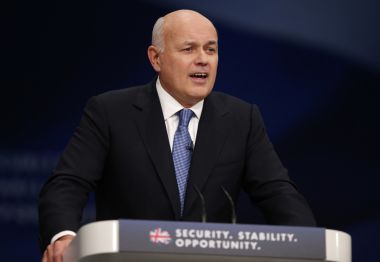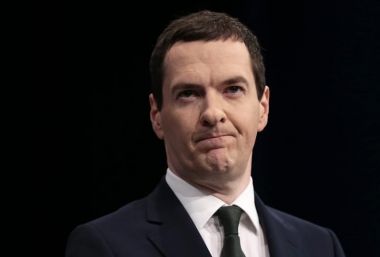Iain Duncan Smith: Did the Christian minister's crusade against poverty do more harm than good?

Make no mistake, this is a political earthquake. Iain Duncan Smith, the former leader of the Conservative Party, the redoubtably tough former army officer and champion of the party rank and file, has resigned. Not because the measures announced in this week's budget were too soft, though. Because they were too harsh.
This is nothing short of astonishing. Since being deposed as leader in 2003, IDS has reinvented himself as a champion of welfare reform – with the hope of reducing so-called 'welfare dependency' and an alleged culture of entitlement. Many of us suspected that alongside this aim, Duncan Smith was aiming (alongside Osborne, Cameron and the rest) to radically reshape the British state – making it significantly smaller in the process.
That he has now resigned, ostensibly because that reshaping of the state has brought consequences with which he disagrees, is vastly significant. It is the biggest show of dissent from a senior government minister since Clare Short and Robin Cook's resignations over Tony Blair's atrocious invasion of Iraq. It's the biggest show of disunity on the Tory benches since John Major's government was riven with splits over Europe 25 years ago, or even since the Westland affair – which forced Margaret Thatcher and Michel Heseltine into opposite trenches.
There are two fascinating and related issues here. The first is why, exactly, IDS has resigned (and why now?) and the second is to do with the moral, or even spiritual nature of his mission and front bench career.
Duncan Smith is a committed Catholic. While he hasn't exactly worn it on his sleeve, it's well-known his faith is integral to his view of the world. His determination to crusade against the evil he perceived in the social security system meant that unlike many former party leaders (Ed Miliband and Nick Clegg for example) IDS retuned to the front bench. When the coalition government was formed in 2010, he became the Work and Pensions Secretary, working alongside Lib Dem Steve Webb – also a Christian.
Duncan Smith's Damascene conversion came years earlier, though. On a visit to a Glasgow council estate, he is said to have realised his future – a battle to eradicate poverty, while also reshaping the welfare state. Not for him simply the lassez faire economic policies of Osborne and Cameron. Instead, he approached reform of the benefits system with a missionary zeal – seemingly believing that he was on a moral mission like his forbears Shaftesbury and Wilberforce – high-minded concepts coursing through his rhetoric.
He set up a think tank – the Centre For Social Justice. It was staffed by committed Christians like Tim Montgomerie, founder of the Conservative Christian Fellowship who went on to become IDS' Chief of Staff, Philippa Stroud (who went on to become one of his special advisers) and Christian Guy (now an adviser to the Prime Minister).
The CSJ was only step one, though. Once in possession of the ministerial brief, IDS began radical reforms. He introduced Universal Credit – an attempt to simplify the benefits system – something even his ideological critics admitted would be a good idea. Yet its implementation has been lamentable. He imposed a benefit cap – a popular policy with tabloid editors – which meant a squeeze in living standards for families with few other options. His reforms to benefits for disabled people were the most controversial. Chronically ill and disabled people were made to prove they weren't fit to work. The department looked to slash costs and far, far too often, with the work outsourced to private company ATOS, awful decisions were made.
Herein lies the contradiction of Duncan Smith. I firmly believe he wanted to do the right thing and saw reducing benefits as a vital contribution to the common good. Yet he pig-headedly refused to acknowledge when the consequences of the changes proved disastrous – especially for vulnerable groups. That he has finally, belatedly, spoken out about the consequences of cuts on disabled people this week is welcome, but for many it is simply too little, too late.
IDS was pictured punching the air when the Chancellor announced an increase to the minimum wage (incorrectly branded as a 'living wage'). His ideology is a good one – in theory. We would all like to see a high wage, low welfare economy. The problem came when he tried to implement the low welfare part in isolation. An economy where zero-hours contracts are normalised, where five million people are paid less than the genuine Living Wage, where support for vulnerable people's services is already being slashed, means that only half the bargain is delivered – we get the low welfare economy, but the high wages don't follow.

We find ourselves in 2016, with food banks proliferating, disability charities castigating the government's approach, homelessness on the rise, child poverty set to increase – all while Osborne has repeatedly missed his borrowing targets. The government has failed not only on its own terms, but also on Christian terms as well. A Christian ethic of government asks, 'What did you do for the least of these?' While Duncan Smith's intentions may have been good, the outcomes were dangerously close to failing this test. He now appears to have realised this.
Osborne's ideological fervour to shrink the state and give tax cuts to swing voters has proved too much – IDS has stepped away. He is now free to speak out against government policy and campaign for the UK to leave the EU from the backbenches. I suspect he will also take some time to consider the mission he has embarked upon over the last decade. Has welfare dependency been reduced sufficiently to say 'job done?' At what cost? What now for communities which have suffered swingeing cuts (overwhelmingly in areas which don't vote Conservative). These aren't just questions for Duncan Smith to ask himself, but also for another committed Christian, his successor as Work and Pensions Secretary, Stephen Crabb.











